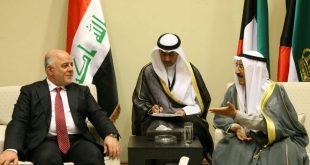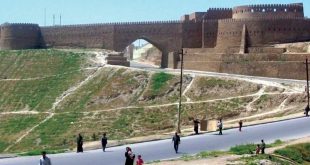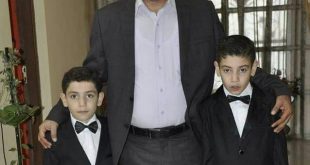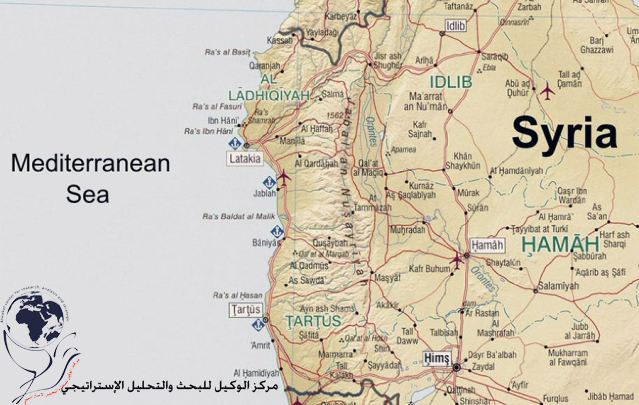
What evoked the Russian bear causing it to lose its patience and turn it into an angry and ferocious tiger? The incident’s repercussions in Syria have begun to touch the heart of Moscow’s interests, its red lines, its national security, and the future of its existence in the area. The Kremlin sees that the vital area of Russia’s national security is now exposed to threats and that also goes for the navy base in Tartus, and the project of Jableh’s harbor – 32km south of Al-Lattakia – Has come a long way in rebuilding the old Soviet anchorage and submarine platform.
While the tension rise in the political and media circles about the true motives of the Russian direct intervention in the Syrian heated lands, and despite of the many analysis, information, and guesses that were made for this critical file, many question marks and wonders still rise in the face of observers, needing objective neutral answers and non-politicized explanations, of which the following for example:
- Does the Russian military intervention seek to protect president Bashar’s regime or to fight ISIS and stand up against terrorism?
- Did Russia send its air force, soldiers, and equipments to defend its vital interests and national security or to find a place in the area for it on the debris of the American failure?
- What evoked the Russian bear making it lose its known patience and turning it into an angry and ferocious tiger? To answer those questions we will try to present a primary analysis and a read on the Syrian scene and its political and military aspects as following…
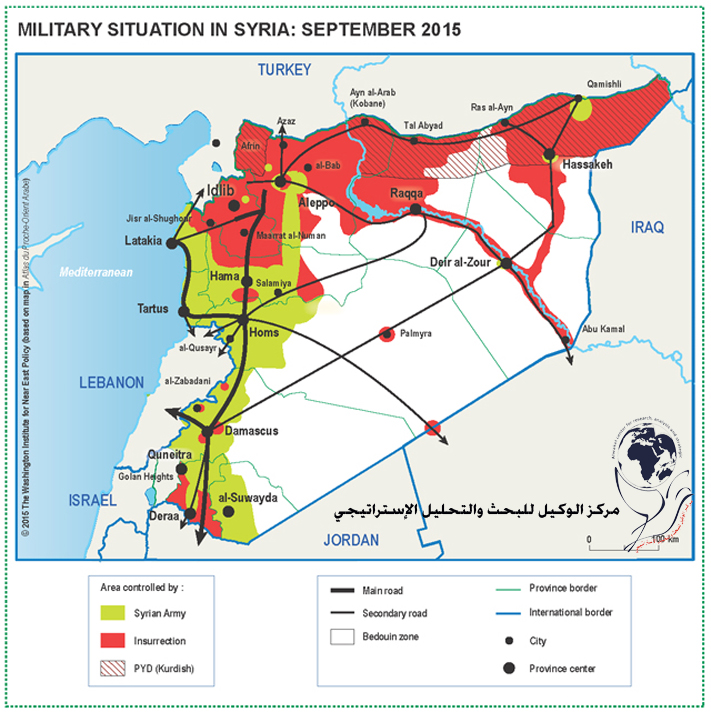
September’s map of the military state in Syria
The Syrian areas neighboring the Turkish borders witnessed in the last few months speeding developments represented in the full fall on Idlib city in the hands of the armed terrorist group (Al-Fatah army), which is a platoon dissenting from Al-Nusra Front – the military arm of Al-Qaeda Organization in Syria –, it includes a mix of the Islamic Army, the Free Syrian Army, the Salafists, and Al-Nusra Front, sponsored by Turkey. And for clarification, since 2014 the armed groups have been ruling the strategic Kurd Mountains and most of the borders with turkey up to Kessab Armenian village that was conquered by those groups in 2014 and destroyed the Russian radars and equipments positioned on the top of Al- Aqra Mountain, and soon withdrew from there after failing to progress south. And it might be helpful to remember that there is a geographical extension between the Kurd Mountains and the rebel areas in the north-west up to Jisr al-Shughur, which represent a major threat to Al-Lattakia city that is of an Alawi majority. That situation made the Syrian president form an armed force from the people of the city especially an Alawis youth fleet – who refused to fight outside their city – which he named The Coastal Shield Brigade, and it connects to the Syrian Arabic Army with operations, preparing, and training, and its mission to protect the Syrian coast and stop any possible threat.
Why Al-Lattakia not Tartus?
In July 2015, an aggression from armed men in Al-Ghab Plain area threatened Al-Lattakia city and the Alawi villages of low population in the north-west of Al-Ansariye Mountain. This situation alerted the Syrian authorities warning them from the possibilities of Sunni Movements existing in Al-Raml Al-Filistini (Palestinian sand) district, also the refugees from Idlib and Aleppo are estimated to be 200,000 according to the United Nations Office for the Coordination of Humanitarian Affairs (OCHA) and the majority is of the Sunni Sect. And the regime fears the possibility of their rebellion against the government at a defining moment. And there are other reasons that put Al-Lattakia and the coast in the circle of interest and conflict, we mention the most important:
- The armed groups’ need for a main harbor made them plan and gather towards the coast.
- The choice was set on Al-Lattakia due to its vital location overlooking the Mediterranean. And now it represents a strategic and symbolic target for the armed groups.
- Al-Lattakia is closer to the supply lines and the areas under military authority.
- The road to it is less complicated than Tartus, especially after the Syrian Army and Hezbollah tightened their control over the borders with Lebanon and the communication lines with the Lebanese Sunni areas in Akkar and Tripoli got complicated. This strategy became clear in Al-Qusayr battle in 2013.
- Tartus is an Alawi city and the road between it and Homs is inhabited by an Alawi majority, and that complicate the military scene as the existence of a counter environment front of the insurgents.
- Al-Nusra Front has a military experience and knowledge of the geography and nature of the land, which enabled them to reach the sea after controlling Kessab village north-west of Al-Lattakia before withdrawing from it later.
Russia and Syria
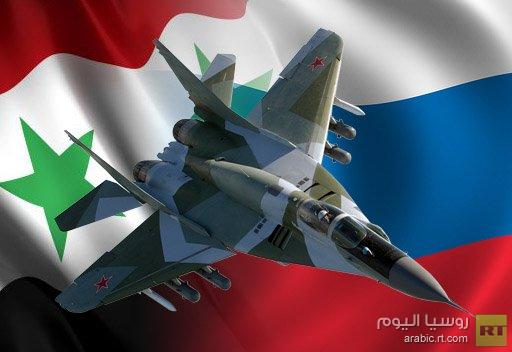
All of these factors – plus the weakness that struck the Syrian Forces in the country’s north and north-west, the threats in Damascus the capital and its countryside, the threats in the south, and ISIS’s control over wide areas in the east – pushed Russia out of its silence and made it leave the long breath policy and change to direct military intervention, after finding that the events’ fallouts has begun to touch the core of its interests, redlines, national security, and the future of its existence in the area. Moscow sees that vital spectrum of Russian national security is now under threat, and that also applies to its navy base in Tartus and its project in Jableh’s harbor – 32km south Al-Lattakia – that Has come a long way in rebuilding the old Soviet anchorage and submarine platform, taking in consideration their existence in Bassel Al-Assad air force base making them also become a strategic target for the armed groups.
This whole situation sheds some light on the recent questions about the Russian intervention in Syria (Russia’s safety and interest comes first before all other) and the Kremlin has found the right opportunity to divert the attention away from the Ukraine case at least temporally, taking advantage of the American failure in dealing with the Syrian file and the worldwide fear from an increase in the risk of armed terrorist groups in general and particularly ISIS. As for president Al-Assad’s regime, it finds a relieve in that intervention which enables it to catch its breath and reorganize the cards of the bloody game while waiting for a political relieve that ends the tragedy of Syria and its wounded people.
 Dheyaa Alwakeel
Dheyaa Alwakeel
